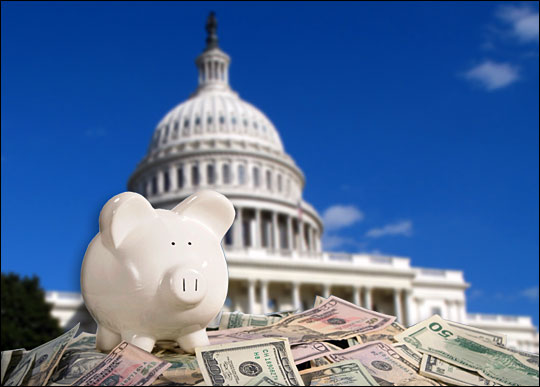
The $789 billion economic-recovery bill looks good in terms of green spending, according to preliminary analysis from the Center for American Progress. The House and Senate reached agreement on the bill on Wednesday and are expected to approve it by the end of the week; President Obama hopes to sign it into law by Presidents’ Day.
The bill contains at least $62.2 billion in direct spending on green initiatives and $20 billion in green tax incentives, while funding for nuclear and coal projects was dropped from the final version. Here’s the breakdown:
Energy transmission and alternative energy research:
- $11 billion for smart grid
- $7.5 billion for renewable energy and transmission-line construction
- $400 million for the Department of Energy’s Advanced Research Project Agency for Energy for the development of alternative energy sources and efficiency
Efficiency:
- $4.5 billion for energy-efficiency improvements to federal buildings
- $6.3 billion for local government energy-efficiency grants
- $2.25 billion for energy-efficiency retrofits for low-income housing
- $2.25 billion for the HOME Investment Partners Program to retrofit community low-income housing
- $5 billion for the Weatherization Assistance Program for efficiency in low-income households
- $510 million for energy-efficiency retrofits for Native American housing programs
- $420 million for energy-efficiency improvements at the Department of Defense
- $300 million for Department of Defense research on energy efficiency at military installations
- $300 million for the appliance rebate program for Energy Star products
Mass transit and advanced automobiles:
- $8.4 billion for transit capital assistance programs
- $8 billion for Amtrak and intercity passenger rail
- $300 million for the purchase of more alternative-fuel and hybrid vehicles for the federal fleet
- $300 million in grants and loans for technologies that reduce diesel emissions
Green jobs training:
- $500 million for green jobs programs through the Workforce Investment Act
The Senate version of the bill had contained $4.6 billion for the research and development of carbon-capture-and-sequestration (CCS) technologies for coal-fired power plants and $50 billion in loan guarantees for the nuclear industry, but that funding appears to have been dropped entirely, to the delight of enviros.
“This is a huge win, for our planet and for taxpayers who want stimulus funds to be invested wisely,” said Friends of the Earth President Brent Blackwelder. “The bailout in question would have thrilled nuclear industry lobbyists but done virtually nothing to stimulate the economy. Congressional leaders did the right thing and prevented waste by removing this bailout.”
“It’s rare for a compromise to make a bill better, but that’s what happened yesterday,” said Gene Karpinski, president of the League of Conservation Voters. “According to the reports we’ve seen, the members of the Conference Committee kept the best aspects of the House and Senate versions of the bill. Tens of billions of dollars for clean energy, energy efficiency, public transportation, scientific research and a smart energy grid remain. Tens of billions set to be wasted on coal and other outdated energy sources were removed.”
UPDATE: Some of the stimulus funding could still go to CCS projects, as a summary of the bill says it includes $3.4 billion for “fossil energy research and development.” Read more.

